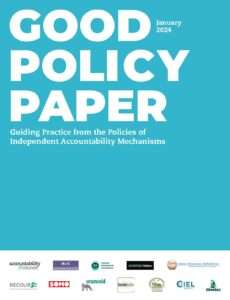
Independent Accountability Mechanisms (IAMs), when implemented effectively, can be transformative tools for justice. IAMs are a forum for communities whose human rights and environment are harmed by investments to raise their concerns and have them addressed.
In 1993, the World Bank created the first independent accountability mechanism in response to political and public pressure from civil society seeking to ensure that project-affected communities could seek remedy. Since then, many other development finance institutions (DFIs), development agencies, and other financial institutions have followed suit.
As financial institutions without IAMs consider creating them, and as existing IAMs continue to improve their policies to better serve communities, there is much to learn from existing policies. The Good Policy Paper: Guiding Practice from the Policies of Independent Accountability Mechanisms is a roadmap to guide the development of new IAMs and the revision of existing IAM policies. The new and improved 2024 edition of the guide examines the current policy provisions in place at IAMs from the perspective of communities using them to seek redress for environmental and social harm from internationally financed projects, and offers the most up-to-date standards and recommendations for other IAMs to follow. It is particularly important for IAMs developing frameworks and policies for remedial action.
The guide is authored by Accountability Counsel, Bank Information Center, Center for International Environmental Law (CIEL), Centre for Research on Multinational Corporations (SOMO), Community Empowerment and Social Justice Network (CEMSOJ), Gender Action, Green Advocates International (Liberia), Inclusive Development International, International Accountability Project, Jamaa Resource Initiatives, Recourse, and urgewald.
Originally published on December 13, 2021. Updated on January 16, 2024.
